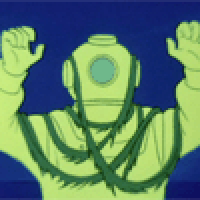More details in the compete post: https://www.tumblr.com/lavenderhorns/705277666010464256/every-now-and-then-i-remember-that-malbolge-exists?source=share
In the soap opera General Hospital, Colonel Sanders of KFC makes a guest appearance because someone is trying to kill him to obtain the secret recipe of 11 herbs and spices. He knows Malbolge and is able to disarm the destruct sequence.
… I… what?
I thought you were kidding.
Well, I wasn’t kidding, but I put about a 50% chance that someone had just vandalized the wiki page…
Thanks for finding that, absolutely golden lol
That soap opera apparently has 15000 episodes and has been airing since 1963…
So you’re saying that might not even be the craziest episode?
The chance of that is definitely not negligible
This is peak programming. That’s it. It’s done. We can pack up and go home now.
Sounds like Javascript and co-pilot to me.
Apparently, this is the code for a Hello World program in Malbolge:
(=<
#9]~6ZY327Uv4-QsqpMn&+Ij"'E%e{Ab~w=_:]Kw%o44Uqp0/Q?xNvL:H%c#DD2^WV>gY;dts76qKJImZkjdeleted by creator
Huh. Looks just like Perl.
deleted by creator
Biblically correct hello world
Beautiful
And I’ve heard it took years until someone managed to do it
Mom, put down the phone, I’m using the modem!
Holy cow.
The Base3 arithmetic alone makes me deeply upset
Base36 is where it’s at! Super divisibility, 0-Z keyspace, and “10” is a Square that’s also the product of two squares.
Plus you can count to “40” (144) on your hands!
How do you count in base36 on your hands? I seem to only have 10 (decimal notation) fingers
You can count up to 1023 in base 2 using your fingers to represent 0s and 1s.
In theory yes, in practice…fingers don’t like cooperating with the combinations of bent and up that you can get by doing that
Yeah, fingers have a strong union.
I understand this, but I didn’t know how one would count up to 36 the first time around. PhlubbaDubba is using joints in their fingers to get additional objects to increment on. If we only used our fingers, we could only get to 10
Each hand is one base-6 digit.
deleted by creator
Using your thumbs as pointers, count the joints in your fingers on one hand, that gets you to 12, use the other hand’s finger joints to count the thirds within 36, with 4 fingers on the other hand, that’s “40”
Despite this design, it is possible to write useful programs.
Interestingly, this applies to C++ too.
So is there a 9th circle? Would that be a programming language where the only way to compile would be to speak op-codes out loud in the correct sequence & cadence into a microphone?
oh my god don’t give them any ideas for tonal programming languages
Too late, take a look at teletext and RDS for radio, and also literally the very first cable free TV remote controls
There’s a conlang introducing phonemic hats, so why the hell not?
Looks interesting. Except for the fact that an instruction is modified after execution, this is quite simple in the end. Unless I missed something. But yeah, self-modifying instructions makes loops really hard.
“counter-intuitive crazy operation” meh, we already have that, it is called Haskell.
Haskell’s crazy operation is intuitive though. Assuming you’re talking about
>=, it’s just a generalizedflatMap.This is probably a rather controversial topic in the haskell community. Haskell library and base has a tendency to provide “too many“ infix operator (at least IMO), many of which makes code hard to read for beginners and experts alike.
See the discussion here: https://wiki.haskell.org/Haskell_programming_tips/Discussion#Use_syntactic_sugar_wisely
As a professional Haskell developer, I tend to agree. I loathe any and all lens code I find using a ton of operators (though I just dislike lenses in general). Operators from base are generally fine, but for the rest, just use normal functions damnit. Operators suck for code navigation too.
Yeah, it is one of the problem I have about Haskell.
The other two are lazy evaluation makes print debugging almost impossible, you will need to print the entire environment to figure out where you are.
Finally, I feel like List.fold, state monad, lens are basically just working with mutable structure with extra steps. Although this constructs prevent newbies who are not principled enough to effectively use mutable structure from using mutable structure, but it also doesn’t help experienced user to write more effective and clean code.
Mutuabilty are certainly not harmless either. For example in ocaml, if you construct the IntSet type twice, they will be two completely different type. But this behavior can be pretty easily avoided by an experienced user.
What do you feel about these features/shortcomings?
Haskell is abstract, and very different from other popular languages, but I actually find it very intuitive. At the very least, the type system makes it extremely predictable.
I didn’t imagine a joke would attract this many people defending Haskell. LOL.
I personally would say I hate Haskell the least among most of the PL I know, maybe except ocaml. Haskell is probably the second if not the most popular programming language (not including proof assistant) in my field, next to Ocaml; and I have been teaching it for couple years. My work is also heavily involved with category theory, so I don’t personally mind the category theory jargon.
But all of these doesn’t mean Haskell is without its flaws. For this post in particular, I am referring to one of the long standing debate in the haskell community of whether Haskell user and developer has a tendency to overuse exotic infix operators: https://wiki.haskell.org/Haskell_programming_tips/Discussion#Use_syntactic_sugar_wisely
Haha, an actual category theorist! You should have gone with “we have more than one of those in Haskell” or something, then. As it is, it really just reads like someone who thinks higher-order functions are too hard of a concept, and that the whole language is therefore garbage.
welp, karma is not a thing here, nor do I care about them. It is great to see people loving haskell, it is a decent language <3.











